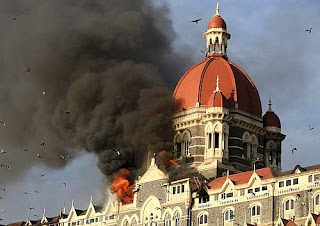 That’s one of many quotes from survivors featured in “Terror in Mumbai,” a new HBO documentary narrated by Fareed Zakaria. It’s solidly in the running for the most profoundly disturbing hour of television I’ve ever seen.
That’s one of many quotes from survivors featured in “Terror in Mumbai,” a new HBO documentary narrated by Fareed Zakaria. It’s solidly in the running for the most profoundly disturbing hour of television I’ve ever seen.
Now, a year having passed since the attacks, and with Indian Prime Minister Manmohan Singh currently visiting Washington, it’s a good time to reflect anew on the Mumbai atrocities. My readers know that I remain suspicious of attempts to “understand” terrorism, which is all too often a euphemism for excusing, explaining away, minimizing. And yet understanding, in the true sense of the word, is possible and desirable. “Terror in Mumbai” is helpful to say the least.
Along with gut-wrenching surveillance footage of the attackers, “Terror in Mumbai” features actual audio of cell phone conversations between the terrorists and their dispatchers from Lashkar-e-Taiba (LET, “army of the righteous” or “pure”) in Pakistan. At some point in the past, covert Indian operatives had funneled SIM cards to LET in the hope they’d eventually be activated and serve as tracking devices. Three of those cards were in fact used during the Mumbai attacks. So now we know exactly what was said and how it was said. There isn’t a single “dramatization” in the film.
The LET controllers come across as stern taskmasters, ordering the young shooters at every stage. In contrast, the attackers themselves sound diffident, hollowed out, damaged. The immediate parallel that came to mind was child soldiers in Africa. Even if the LET attackers were a good deal older than that, they seemed to lack a developed conscience, as if they’d been grabbed as kids and had their souls expertly removed. This is not to deny that they’re responsible for their actions. But the men on the other end of the phone — these are the true monsters. It couldn’t be clearer.
Kasab, the sole attacker to be captured alive, is interrogated shortly after his arrest, and we see the footage. He’s singing like a canary to the authorities — naming his organization, his commanders, every detail of the operation. The conversation seems easy, unhurried. Kasab is wounded from his arrest but as far as we know there’s been no torture. (Further proof that life is not an episode of “24”.) At one point Kasab even shows remorse. He ended up an LET foot soldier after being sold — sold — to the group by his own father.
One couple from Turkey reports that they were spared on account of being Muslim, but this was an off-the-cuff decision by the nearest gunman, not a directive from LET. Here is a list of the Muslims killed and injured in the attacks. Let no one believe for a second that groups like LET care about the human rights of Muslims.
In two of the taxi cabs they rode in, the terrorists left behind bombs to explode later at random, which they did, killing the drivers, their passengers and bystanders.
“Progressive” commentators like Richard Silverstein actually had the gall to argue that the attack on Nariman House, the Chabad Jewish center, was not antisemitic but merely anti-Israel. David T had the appropriate reaction at the time. Suffice it to say that in the film, we hear “Brother Wasi,” the main LET dispatcher, say to one of the gunmen at Nariman House: “As I told you, every person you kill where you are [Nariman House] is worth 50 of the ones killed elsewhere.”
Even more sickening is the fact that Brother Wasi enlisted one of the Nariman House hostages, Norma Rabinovich of Mexico, to help negotiate a swap for Kasab, the terrorist who’d been arrested. Rabinovich was instructed to phone the Israeli consulate in Delhi and have them broker a deal with the Indian government. In a particularly painful moment in the film, we hear Rabinovitch speak to Wasi and desperately try to placate him. Wasi responds calmly, in very good English:
“Don’t worry then, ah? Just sit back and relax and don’t worry and just wait for them [the Israeli consulate] to contact. Ok?”
Rabinovitch responds, “Yes, sir,” her voice turning upward in a pitiable, fear-choked cry.
Wasi says: “And save your energy for good days.” And then: “If they contact right now, maybe you’re gonna celebrate your Sabbath with your family.”
The skin crawls. Wasi is not being compassionate — he is twisting the knife by mocking Rabinovich’s suffering with a reference to her Jewish identity. Not 12 hours later, he orders the gunman to execute her and her fellow hostage, Yoheved Orpaz. Interestingly, the shooter attempts to buy time for about an hour, reluctant to carry out the command. But he finally does it, and we hear the gunfire.
It’s not clear that Silverstein buys his own bullshit. Consider this final remark:
Even the Chabad movement should taken [sic] to task for not providing greater security for its facility. In a city already beset by past terror attacks, any target perceived as Jewish or Israeli (not just Israeli government buildings) should have had serious surveillance (ie security cameras) and the ability to lock itself down quickly. [My emphasis.]
Put aside the victim-blaming here and simply mark Silverstein’s words: “Any target perceived as Jewish or Israeli.” He just got through telling us that LET had no antisemitic agenda. So why should the mere perception of Jewishness matter? Because for all his sophistic rambling, Silverstein knows full well that it does.
Comments are closed.
